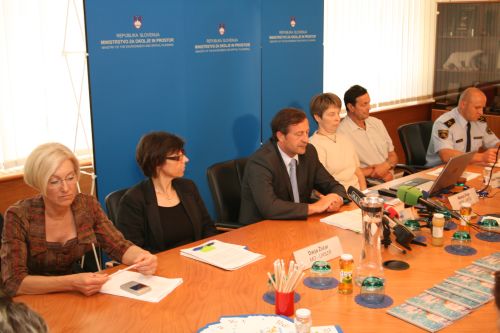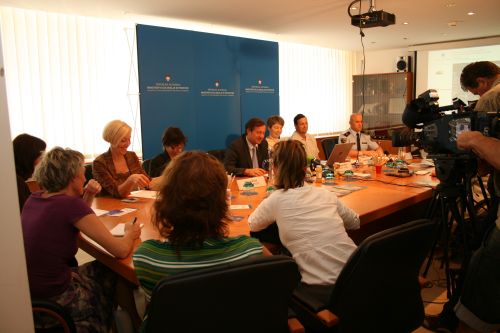The bathing season has begun, therefore the Ministry of Environment and Spatial Planning organised today, on 9 June 2009, a press conference, in which the representative of various institutions told how safe and healthy are the bathing waters in Slovenia. The representative of police pointed to some basic preventive measures that must be taken into account for safe bathing or diving.
The participants of the conference agreed that the management of bathing waters is a demanding task, therefore it is mandatory to involve all departments that can contribute to safe and health bathing, both in the field of environment protection, health, defence and protection, and internal affairs, and police.

On the photo: Karl Erjavec, Minister for Environment and Spatial Planning, Mateja Poje from the Agency of RS for environment, Aleš Petrovič, dr. med., from the Institute of RS for protection of healtth, Darja Žličar from the RS Administrationfor protection and rescuing, and Boris Rojs from the General Police Directorate
The Ministry of environemnt and spatial planning is preparing a list of bathing waters, it establishes quality of bathing waters regularly on an annual basis, and proposes measures in case of poor quality of bathing waters. The Ministry of Health assesses regularly during the bathing season the hygienic suitability of bathing water for bathing. However, for safe bathing, not only good quality of water is important. Bathers must be aware of other types of dangers as well, in particular from the aspect of safety against drowning; the tasks in this field are the responsibility of the Ministry of Defence.
At the press conference, Boris, Rojs, Higher police inspector in the Uniformed police Directorate at the General Police Directorate, presented activities and measures of the police during the bathing season, preventive advices of the police for greater safety in and by the water and warnings for self-protective behaviour against thefts.
The Ministry of the Interior or The police is namely the authority of enforcement against environmental polluters; in addition is also carries out numerous preventive activities, by means of which it tries to raise the awareness of bathers and thus contribute to safer and healthier bathing. Also in this year's tourist season, police officers will, in the framework of their regular activities of ensuring safety of life and property of people and protection of the environment, warn bathers to take (better) care of their property as every year there are many thefts of bags, purses, documents, mobile phones, money and other objects people carry to the beach. Above all at the sea coast and in the areas with larger bathing site, police officers will also give them advice on how to avoid dangers to which bathers and divers are exposed.

According to words of Boris Rojs, the police will take repressive measures against those bathers and divers who with their actions endanger themselves and other bathers. The police will above all take measures against those persons who with their acts cause sudden and excessive pollution of waters, which can cause heavier consequences for the environment and endanger life and property of people.
He emphasised that rescuers from water still play the main role in direct provision of the safety of bathers. They have some special powers, as they can identify the bather and prohibit him/her to use the facilities and equipment for bathing if by his/her behaviour he/she obviously endangers himself or other bathers. In addition, the rescuer can also inform the police on the failure to observe his instructions and they can fine the bather.
In the end, he summed up some most important advices for greater safety in and beside the water:
- in organised bathing areas, bathing rules are established and should be followed
- where bathing is regulated, it is allowed on water surfaces that are physically separated from water surfaces intended for sports and other activities
- in the sea, bathing is, in principle, allowed within the limits of a 150-m strip along the coast
- at illegal or non-organised bathing sites (gravel pits, lakes, rivers, ...) we can bathe on our own responsibility as these bathing sites do not have organised rescue services or managers. Illegal bathing grounds can be marked with warning tables or not.
For safe bathing, it is good to take into account the following advices:
- do not jump into murky or water if you do not know its depth
- never leave children unsupervised
- do not swim alone over longer distances
- do not swim under the influence of alcohol
- water flows, eddies, rapids and pools represent additional danger of drowning.

